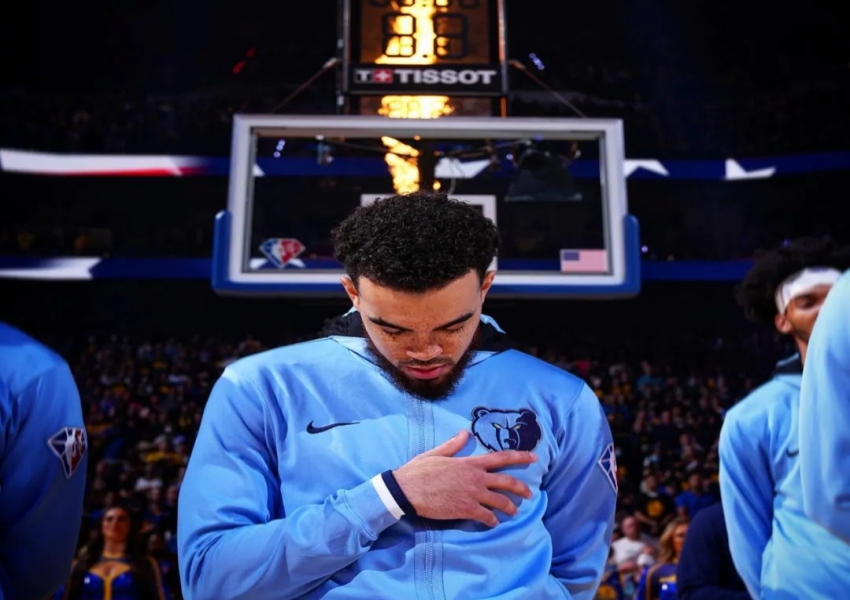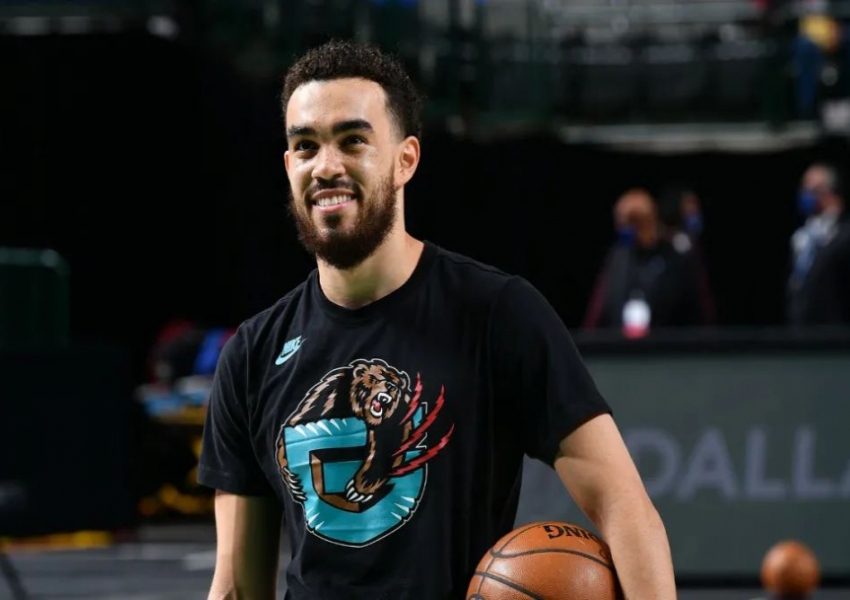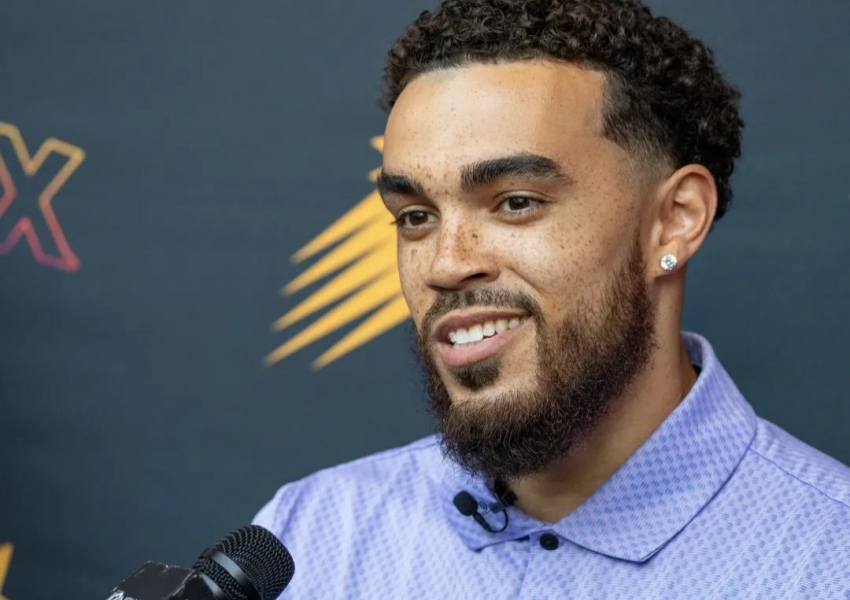Turning Down Millions! Will Tyus Jones at $3.3 Million Be the Suns' Championship Catalyst?
In a surprising and calculated move, Tyus Jones recently signed a one-year, $3.3 million deal with the Phoenix Suns—a price tag that many in the basketball world have labeled a steal. Given Jones’s performance last season, it’s easy to see why. By all accounts, he was expected to command a much higher salary, potentially in the eight-figure range. Yet, Jones made the deliberate choice to forgo larger offers in favor of joining a championship-contending team where he could secure a starting role, a decision that may well shape the Suns' fortunes in the upcoming NBA season.

Jones’s signing has raised eyebrows across the league, and rightfully so. He was offered multiple deals during the free agency period, including one from his former team, the Washington Wizards, and another from the New York Knicks, who reportedly put a two-year, $10 million offer on the table. At least one other offer exceeded what the Knicks were willing to pay, yet Jones turned them all down. His rationale? A clear desire to compete for a championship as a starting point guard—a role the Suns, desperate for a true floor general, were willing to guarantee him.

For the Knicks, landing Jones would have been a significant move, but the reality of their roster likely made the offer less appealing to him. With Jalen Brunson firmly entrenched as the team’s starting point guard, Jones would have faced stiff competition for minutes and likely wouldn’t have started. In today’s NBA, where ball-dominant guards are often the linchpin of a team’s offense, Jones saw a limited path to achieving his goals in New York or on other contending teams, all of which already boasted established starting point guards.

That’s where the Suns entered the picture. Despite assembling a formidable trio in Kevin Durant, Devin Booker, and Bradley Beal, the Suns had struggled to find a point guard who could effectively organize the offense and distribute the ball without disrupting the dynamic of their star-studded lineup. The absence of a true point guard was painfully evident last season, where Booker and Beal, both more natural scorers, were forced to take on playmaking responsibilities. While they managed admirably, the lack of a pure facilitator was a glaring weakness, especially during the playoffs.
Enter Tyus Jones, who, despite playing for a lowly Washington Wizards team that won just 15 games last season, showcased his value as a starting point guard. Jones started 66 games, averaging 29 minutes, 12.0 points, 2.7 rebounds, and 7.3 assists per game. His shooting splits were impressive, with a 48.9% field goal percentage, 41.4% from three-point range, and 80.0% from the free-throw line, culminating in a true shooting percentage of 57.8%. These numbers illustrate Jones’s ability to contribute effectively on the offensive end, even within a struggling team context.
Jones’s playmaking ability is one of his most underrated assets. Over the past four seasons, his assist numbers have steadily increased, from 3.7 assists per game in 2019-20 to 7.3 last season. His assist percentage of 33.1% ranked just behind NBA greats like James Harden and Chris Paul. What sets Jones apart, however, is his remarkable ability to take care of the basketball. Last season, he averaged just 1.0 turnover per game, leading the league with an assist-to-turnover ratio of 7.35—a figure that dwarfed even Chris Paul’s career-best ratio of 5.2. Jones’s commitment to protecting the ball isn’t a fluke; he’s led the league in assist-to-turnover ratio for six consecutive seasons, with his lowest ratio being an impressive 5.14.
This level of ball security is precisely what the Suns need. Last season, Phoenix averaged 14.9 turnovers per game, ranking sixth-worst in the league and first among playoff teams. In the playoffs, the turnover issue persisted, with the Suns committing 14.3 turnovers per game. In Game 2 of their series against the Timberwolves, the Suns committed a staggering 19 turnovers, leading to a 31-2 disparity in points off turnovers. The game ended in a 12-point loss, a margin that might have been reversed had someone like Jones been controlling the offense.
Jones’s decision to join the Suns was met with widespread acclaim, including from noted salary cap expert Bobby Marks, who called him the “second-best point guard in this summer’s free agent market, behind only Maxey.” For Phoenix, landing Jones at the veteran minimum is nothing short of an S-tier move, especially considering new head coach Mike Budenholzer’s emphasis on point guard play. According to Jones, Budenholzer has already outlined how he envisions Jones impacting the team, emphasizing his role in orchestrating the offense and reducing the team’s turnover issues.
However, it’s important to acknowledge that Jones isn’t without his flaws. His defense has been a point of concern, and when paired with Booker and Beal, the Suns’ backcourt defense remains an open question. While Jones may struggle to contain elite guards, this is a problem that extends beyond him and speaks to a broader defensive challenge for the entire team. In crunch time, it wouldn’t be surprising to see defensive specialists like Grayson Allen or Royce O’Neale take his place, depending on the matchup.
Jones’s gamble in signing a veteran minimum deal rather than a more lucrative contract is a high-stakes bet on himself and the Suns’ potential. History has shown that many players who start taking veteran minimum contracts find it difficult to regain their market value, as teams often perceive them as less valuable over time. For Jones, this season could be a make-or-break moment in his career—a chance to prove that he can be the starting point guard on a championship team, or risk being pigeonholed as a journeyman backup.
There’s something undeniably admirable about Jones’s willingness to prioritize a starting role and a shot at a championship over a guaranteed payday. It’s a level of conviction that not all players possess, and it speaks to his belief in his abilities and his understanding of the unique opportunity that the Suns presented him. If Jones can help Phoenix unlock its full potential and guide them to a deep playoff run, his decision will be vindicated, and he’ll likely find himself back in the market for a more lucrative deal next summer.
But for now, all eyes will be on how Jones integrates into a Suns team with championship aspirations. Will he be the steady hand they’ve been missing, the catalyst that turns their talented but disjointed roster into a cohesive unit? Or will the defensive limitations and the pressure of playing alongside three superstars prove too much? One thing is certain: with Tyus Jones at the helm, the Suns’ point guard issues might finally be a thing of the past. And if Jones can elevate the Suns to the heights they’re aiming for, his $3.3 million contract will be remembered as one of the biggest bargains in NBA history.
Copyright Statement:
Author: focusnba
Source: FocusNBA
The copyright of this article belongs to the author. Reproduction is not allowed without permission.
Recommended Blog
- Yi Jianlian Buys Guangzhou Team for 580 Million? CBA Smiles as the Biggest Star Finally Returns
- Clippers' 2-for-1 Swap for Poole? The Entire NBA Is Laughing! From Championship Contender to Bench Player...
- Officially Declined! No. 3 Paul Out of the NBA, Spurs Set to Shake Up Western Conference Playoff Picture...
- Officially Signed to a Max Contract! 25 Points and 18 Assists! The First Core Player Rejected by Team China...
- Crazy Moves! Zhou Qi to Join Liaoning? Are They Really About to Dominate the Entire CBA...
- The Second Star of France: Can Olympic Second-Teamer Guerschon Yabusele Make an NBA Comeback?
- Just After Winning Gold, Kevin Durant Considers Retirement: Will He Play in the 2028 Olympics?
- 54 Points and 11 Rebounds for the Win! DeMar DeRozan Claims the Crown: Goodbye Harden, Meet the NBA's New Top Shooting Guard
- Brought to Tears: 20-Year-Old Victor Wembanyama's Olympic Heartbreak Is Nothing to Be Ashamed Of
- Farewell, Curry! Eight Threes and a Gold Medal: The Savior of Team USA Basketball